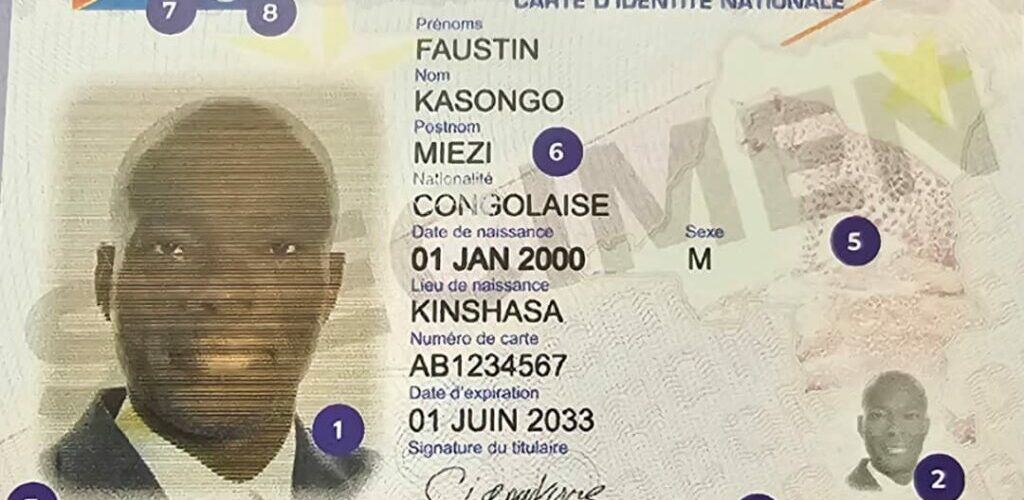In a world where data is the new gold, secure identification systems have become the bedrock of nation-building.
Whether ensuring fair elections, tracking citizens for public services, or fortifying national security, identification systems are crucial for governance.
This is especially true for the Democratic Republic of the Congo (DRC), a nation dear to me that’s endowed with vast natural resources but continually plagued by political instability and security challenges.
Today, the DRC stands at a pivotal moment, with the potential to redefine its sovereignty and strengthen its borders through the adoption of cutting-edge biometric technology.
A Glimpse into the Past: A Nation at a Crossroads
To understand the gravity of the DRC’s current endeavor, one must appreciate its complex history. The DRC, with a population nearing 110 million, has always been a nation of paradoxes.
While blessed with abundant natural resources—including minerals critical to the global tech industry—it has been continuously beset by conflict and instability.
Governing a nation of over 200 ethnic groups across a landmass the size of Western Europe has proven to be an enormous challenge, particularly given its tragic history.
From the dictatorship of Mobutu Sese Seko, who ruled with an iron grip from 1965 until his overthrow in 1997, to the ensuing conflicts that engulfed the nation in “Africa’s World War,” the DRC has struggled to assert control over its territories.
The eastern part of the country, in particular, remains a hotbed of violence, with armed groups frequently destabilizing the region.
These groups, often backed by foreign powers or corporations interested in exploiting the region’s mineral wealth, have continued to wreak havoc despite the official end of the Second Congo War in 2003.
Today, more than 100 armed groups are still active in North and South Kivu, perpetuating cycles of violence and insecurity.
The concept of national identity in the DRC has often been ambiguous, leading to voter fraud, illegal immigration, and widespread corruption.
For decades, the lack of a unified, secure identification system has been a significant impediment to national development.
Without reliable citizen data, corruption has flourished, resources have been misallocated, and security has been compromised.
The 2006 elections, touted as the first free elections in four decades, were marred by allegations of fraud, largely due to inadequacies in the voter identification process.
As armed groups continue to destabilize the eastern provinces, the DRC finds itself at a critical juncture.
The nation now stands at a crossroads where it can either succumb to the chaos of its past or embrace the promise of a secure future.
This secure future could be built on the foundation of a reliable and comprehensive biometric identification system that restores trust in governance, enhances national security, and provides a pathway toward lasting peace.
Recent developments, including the 2022 World Bank’s approval of $750 million for governance reforms and infrastructure, underscored international support for the DRC’s transformation, aiming to address key governance challenges and improve living conditions, thereby supporting the biometric initiative’s broader goals.
The Biometric Revolution: From Identity Crisis to Identity Confidence
Welcome to the biometric revolution—a technological leap that promises to resolve some of the DRC’s most pressing challenges.
At its core, biometric identification technology is about securing national identity by using unique biological traits—such as fingerprints, facial recognition, and iris scans—that are nearly impossible to forge.
Unlike traditional paper-based systems, biometric IDs offer a level of security and reliability that can transform governance and strengthen national sovereignty.
For the DRC, the implications are profound. Implementing a biometric national identification system is not merely about modernizing the country’s inexistent ID cards; it’s about laying the foundation for a secure and prosperous future.
Imagine a country where every citizen’s identity is securely recorded and easily verifiable in real-time.
This is not just a pipe dream but a tangible reality within reach.
The biometric ID system would create a comprehensive National Identification Register, ensuring that every Congolese citizen can access public services, vote in elections, and travel with biometric passports that meet international security standards.
Beyond its role in governance, a centralized biometric identification system could be the miracle solution the DRC has been waiting for to gain total integrity, peace, and security.
Border control would be significantly enhanced, with biometric technology ensuring that every person entering or exiting the country is accurately documented.
This would help curtail illegal immigration and trafficking, both of which have fueled the ongoing conflicts in the eastern regions.
With secure borders, the DRC could more effectively assert its sovereignty, reducing the influence of foreign-backed armed groups and allowing the state to regain control over its vast territories.
Case Study: A Global Perspective
The DRC would not be alone in recognizing the power of biometric technology.
Trust me.
India’s Aadhaar system, the largest biometric identification program in the world, has registered over 1.3 billion people, providing them with unique ID numbers linked to their biometric data.
This system has revolutionized service delivery in India, reducing fraud, and ensuring that government benefits reach those who need them most.
Similarly, Ghana has implemented a biometric voter registration system, significantly reducing electoral fraud and increasing public trust in the electoral process.
But the DRC would not merely be replicating these models; it’d be adapting them to its unique context.
The biometric national ID system must be tailored to the DRC’s specific needs, including its vast geographical expanse, diverse population, and history of conflict.
Such technology must have a holistic approach that integrates biometric IDs with other technologies, such as electronic document management systems (EDMS) and electronic archiving systems (EAS).
These systems ensure that government records are secure, accessible, and tamper-proof, further enhancing governance.
Challenges and Opportunities
The path to biometric sovereignty is not without its challenges.
Yes, I know.
The DRC’s technological infrastructure, particularly in rural areas, remains underdeveloped.
Ensuring that biometric systems are operational across the country requires significant investment in infrastructure, including electricity and internet connectivity.
Public trust is another hurdle.
The government must launch a comprehensive public education campaign to ensure that citizens understand how their biometric data will be used and protected.
Financially, the implementation of a nationwide biometric system is a massive undertaking.
But the potential returns—in terms of security, governance, and economic development—far outweigh the costs.
With international support and public-private partnerships, the DRC can overcome these challenges and lead the way in biometric technology adoption in Africa.
The Future is Now
As the DRC stands on the brink of a new era, with its new government in place, the time for action is now.
The implementation of a biometric national identification system would not just be a technological upgrade; it’d a strategic move that will secure the nation’s borders, strengthen its sovereignty, and pave the way for sustainable and safe development.
At Sycamore SARL, we’re ready to provide the technological backbone for this transformation, but the success of this endeavor will depend on the collective will of the Congolese people and their leaders.
Congo has the opportunity to position itself as a leader in biometric technology in Africa.
By embracing this opportunity, the DRC can build a secure, prosperous future for its citizens and set an example for other African nations.
The journey from chaos to control is not easy, but with the right tools and the right mindset, Congo can emerge stronger than ever.
The future is within reach—let’s seize it.





